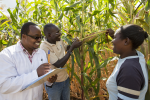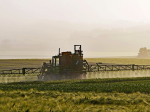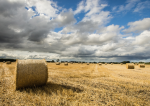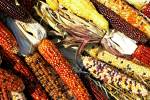News
08.07.2016
Sub-Saharan Africa to be home to one third of global hungry by 2025

Agricultural commodity prices will remain relatively stable in the coming decade, the UN Food and Agriculture Organization (FAO) and OECD said on Monday. According to their “Agricultural Outlook 2016-2025”, increased productivity, weakening demand growth due to overall economic slowdown, lower oil prices and abundant stocks will keep prices low. However, the two organisations underline the need to be vigilant as the probability of a major price swing remains high. In sub-Saharan Africa – the focus of this year’s Outlook – agriculture will face many challenges, such as rapid urbanisation and increased commercial interest in Africa’s resources and farmland. As the region faces rapid population growth, agriculture will continue to be the single largest source of employment for many young people. The Outlook projects that Sub-Saharan Africa’s net imports of food commodities will grow over the next decade, because demand for food is expected to grow at more than 3% over the coming decade, while total agricultural production is projected to rise by only 2.6% a year, despite improved productivity. The authors warn that undernourishment in Sub-Saharan Africa will remain high. Although the rate of undernourishment is projected to decline from an estimated 23 to 19 percent, because of rapid population growth, the region would still be home to a rising share of the world’s hungry. In ten years, Sub-Saharan Africa will account for more than one third of the global total of undernourished people, compared with just over a quarter today. According to OECD/FAO estimates, the global proportion of people who are undernourished will decrease from 11% to 8% over the next ten years, with the total numbers of undernourished declining from 788 million to less than 650 million. “This implies that without decisive steps to move away from business-as-usual, hunger would not be eradicated by 2030 as a global target,” the report concludes. In 2015, world leaders adopted the Sustainable Development Goals (SDGs), a global agenda consisting of 17 goals designed to end poverty and hunger by 2030. Goal 2 aims at ending hunger, achieving food security and improved nutrition and promoting sustainable agriculture. (ab)
06.07.2016
Organic outperforms conventional agriculture in the tropics

Organic agriculture in the tropics not only generates comparable yields, but also produces more income and health benefits for farmers than conventional methods. These are the findings of a long-term study by the Swiss Research Institute of Organic Agriculture (FiBL) in Kenya, that has been conducted since 2007 together with local partners such as the International Centre of Insect Physiology & Ecology (icipe) and Kenyatta University. The Farming Systems Comparison in the Tropics (SysCom) project does not compare apples with oranges but rather conventional and organic high input systems that use external inputs (e.g. biopesticides for organic) and irrigation, as well as conventional and organic low input systems that depend on farm-owned resources. “Our findings show that yields of maize – an important staple and cash crop – under organic production are similar to that under conventional production in high-input systems representing commercial scale farming,” said Dr Noah Adamtey, a coordinator of the project. Also at low input levels, maize yields were similar in both systems, especially under intercropping regimes and there were no differences for pest and disease incidence and damage. Only under maize sole cropping, conventional methods won over organic farming at the project site in Thika. The study shows that organic farming starts to deliver substantial economic advantages as soon as the initial conversion period is over since input costs for organic agriculture are lower while prices on the markets are higher for organic produce. According to Dr Adamtey, “the profitability was similar in both systems from the third year in the absence of premium price, but when premium price was considered, organic farming was more profitable starting from the fifth year.” In the sixth year, organic farmers in Kenya reached a 53% higher benefit. Parallel studies in India and Bolivia on the production of cotton and coffee respectively showed similar positive results for the organic methods. The research also documented the benefits of organic farming methods to soil fertility: “Our results show that soil fertility improved significantly in calcium, magnesium, potassium and soil pH (acidity) levels under the organic approach”, Dr Adamtey confirmed. In addition, the non-use of chemical inputs in organic farming systems also has a positive impact on farms’ ecosystems and the health of people. According to the research team, the organic approach is a viable strategy in the tropics but knowledge dissemination and training in organic farming will require greater attention and support. (ab)
30.06.2016
European Commission extends glyphosate license for 18 months

The European Commission has extended the license for the controversial weedkiller glyphosate by another 18 months. After member states failed to achieve a qualified majority in favour or against the approval, the Commission gave the green light in a last-minute decision one day before the license would have expired. By the end of 2017, the European Chemical Agency, the competent EU agency for the assessment of dossiers for the classification of chemical substances, is expected to publish its opinion. Glyphosate is the world's most widely used weedkiller and the main ingredient in Monsanto’s Roundup brand of herbicides. In March 2014, the International Agency for Research on Cancer (IARC), an arm of the World Health Organisation, classified glyphosate as “probably carcinogenic to humans”. The Commission’s decision was heavily criticised by NGOs and environmentalists. Greenpeace EU food policy director Franziska Achterberg said: “The EU has decided to extend the use of glyphosate without any meaningful restriction, despite WHO warnings that it is a probable cause of cancer. This reckless decision was driven by a Commission that has lost touch with European citizens, quietly backed by many national governments. Heidi Chow, a campaigner with Global Justice Now, said the ruling “means another 18 months of hundreds of thousands of tons of a ‘probably carcinogenic’ chemical being sprayed on our parks, our farms and in our gardens.” The Commission said the decision was taken because “EU Member States failed to take responsibility for the decision on glyphosate extension.” Neither Monsanto was happy with the decision since the authorization was only temporarily extended. The company urged the Commission “to present without further undue delays a proposal for a full renewal under the regulatory framework”. Monsanto announced plans to engage over the coming months with all relevant stakeholders in “productive conversations about glyphosate and the vital role it will play in sustainable agriculture for many years to come.” Civil society and environmental organisations have been campaigning against the use of glyphosate in Europe since the use of pesticides is not in line with their definition of “sustainable agriculture”. On Wednesday, Slow Food called on the EU to “no longer ignore the externalization of the real costs of agroindustry that relies on substances like glyphosate at the expense of human health, animal health, biodiversity and soil health.” Instead, the principles of agroecology should be introduced into agricultural production systems, they said in a press release. Given the 18-months extension, Slow Food called on Member States to set clear restrictions on the use of glyphosate so as to minimize human exposure. This includes a ban for amateur use in gardens and homes, the use in public parks, roadways and railways as well as a ban on spraying food crops just before the harvest in order to avoid high levels of residues. (ab)
28.06.2016
Oxfam calls on food companies to reduce emissions in their supply chains

The top five food commodities (rice, soy bean, maize, palm oil and wheat) together cause more greenhouse gas emissions than any country’s individual footprint, new research presented by Oxfam shows. According to the report “Feeding Climate Change”, emissions from the production of these key food commodities are only surpassed by the footprint of China and the US. If the Paris Agreement’s goals to reach “net-zero” emissions by 2050 and limit global warming to 1.5 degrees Celsius is to be reached, more sustainable agricultural practices need to be adopted. For food and beverage companies this means undertaking efforts to make drastic emissions cuts, especially in the agricultural supply chains that are responsible for the bulk of their greenhouse gas (GHG) emissions. “The Paris Agreement was a big step forward, but we can’t meet its goals without further urgent action,” said Oxfam International’s food and climate policy lead, Tim Gore. “Business and industry leaders (...) must show that Paris is a springboard for deeper emissions cuts and do more to help farmers on the front lines of climate change. The food and beverage sector should be leading the way,” he added. The report identifies emissions from farm soils as a major contributor to climate change. For example, methane produced by flooded rice paddies and nitrous oxide from the use of fertilizers are some of the “super-pollutants” produced by farm soils. Together, these soil emissions are as damaging to the environment as those produced by deforestation to create new farmland. According to the report, rice production is the main culprit of the five key crops. Rice has a significant carbon footprint because of the methane emitted by flooded rice paddies, which contributes about 1.5 percent of global GHG emissions and a significant proportion of agricultural emissions. However, there is no shortage of farming approaches that minimize emissions while supporting adaptation and improving the productivity and food security of small-scale producers, the report says. One innovation that could play a vital role in cutting the massive emissions from rice production while also benefiting small-scale producers is the System of Rice Intensification (SRI). SRI increases farmer’s yields by changing the management of plants, soil, water and nutrients. Instead of continuously flooding fields to prevent weed growth, plants only receive the ideal amount of water and the soil is temporarily kept dry. SRI therefore produces more rice with less water, agrochemicals and seeds while studies have also shown that this method produces less GHG emissions per kilogram of rice compared with conventional rice production. Oxfam calls for a change in how these crops are produced in a way that supports small-scale farmers and helps to build their resilience to climate shocks. The private sector must therefore respect farmer-led innovations such as SRI. According to Gore, “food companies not only need to outline science-based emissions cuts in their supply chain and work with small-scale farmers to implement them, but also help these farmers thrive in the face of the changing climate by guaranteeing them a living income. If food companies fail to act, it’ll be impossible to keep the promises of the Paris Agreement,” he said. (ab)
23.06.2016
New report shows agroecological solutions can feed the world

Agroecology offers humanity essential tools to address climate change, environmental destruction and world hunger. This is the message of a new Friends of the Earth report released on June 21. The report “Farming for the Future: Organic and Agroecological Solutions to Feed the World” busts three common myths about world hunger and details the science that demonstrates that organic and agroecological farming are key to feeding all people sustainably. The authors warn that “today’s dominant industrial food system is rapidly depleting and degrading the world’s soil, water and biodiversity; intensifying climate disruption; consolidating wealth and power over food-related resources; and accelerating world poverty and hunger.” However, agribusiness, philanthropic and international institutions and policymakers defend this system justifying policies, research and markets that propel destructive agricultural practices and concentrate wealth and power in the hands of a few. The most famous myth is that we must significantly increase food production to feed the world. Although modern agriculture is producing more food per capita than ever before, approximately 800 million people are still affected by hunger. Scientists estimate that farmers already produce enough food to feed 10 billion people - far more than the current population of 7.3 billion. “Research consistently demonstrates that world hunger is not a problem of supply, but rather of poverty, lack of democracy and unequal access to land, water and other resources,” the authors write. Another pervasive misconception debunked by the report is that organic and agroecological farming cannot produce enough food. The authors draw an a rich body of research demonstrating that agroecological farming systems, including organic agriculture, can yield more than enough food to feed a growing population while generating significant economic, health and environmental benefits. The authors also refer to the IAASTD report: “Investing in regional sustainable food systems can be a win-win for small-scale food producers, families and local economies by spurring jobs and economic growth. By producing a variety of foods for local processing and marketing, farmers generate local employment and expand community economic activity,” is their summary of the IAASTD. Friends of the Earth conclude: “To feed the world while also confronting multiple environmental crises, we need policies, incentives and public investments that promote agroecology, diversified organic farming and small- and mid-scale farmer livelihoods. Solutions must focus on reviving rural economies, advancing food sovereignty and democratizing governance and power in the food system.” (ab)
16.06.2016
British MPs demand policy changes to improve soil health

More needs to be done to better protect soils for future generations and to promote agricultural practices that benefit soil health, according to a cross-party group of MPs in the United Kingdom. Following an inquiry into soil health and protection that included sessions with leading soil experts, the All-Party Parliamentary Group (APPG) on AgroEcology for Sustainable Food and Farming has released a series of reports with a particular focus on agriculture. Although 95 per cent of our food comes from the soil, the political rhetoric and agenda does not adequately reflect this understanding and the current policy framework is insufficient to ensure that soil is protected, the group warns. “Healthy soil is vital both here and around the world. Failure to tackle current problems will lead to catastrophic environmental, economic and social breakdown,” said Baroness Miller of Chilthorne Domer, who led the inquiry panel. “Reversing the loss of soils, along with restoring knowledge and interest in soil, are essential first steps to sustainable food production.” According to one of the reports, changing diets, increasing populations and downward price pressures from retailers are all combining to put immense strain on the agricultural sector. This pressure has manifested itself in an increasing need by farm businesses to increase outputs while reducing inputs. This, especially when combined with increasingly shorter tenancies, is fostering a culture of short-termism, the MPs warn. The authors state that farming methods such as an increasing cultivation of maize crops for energy use may be implicated in soil compaction and flooding. According to the group, one step that could be taken to build healthier soils is to use measures within Pillar 2 of the Common Agricultural Policy (CAP) to incentivise farmers to improve soil organic matter with initiatives, such as crop diversification to include agroforestry, which could also mitigate against harmful monocultures. For example, cultivation of leguminous cover crops, carefully managed application of manure, rotations, well managed extensive livestock grazing (as opposed to intensive systems), buffer strips – all are examples of techniques which should be encouraged by government policy, the report concludes. Rules with greater scope, force and ambition are required in order to meet the Government’s stated goal to manage soils sustainably by 2030. (ab)
14.06.2016
Land grabs expand the frontier of industrial agriculture, new research warns

The global farmland grab is far from over – there are new "hard-core" initiatives with the aim of expanding industrial agriculture, intensifying conflict around the world, according to a comprehensive dataset released by GRAIN today. The new data builds on previous research published by the non-profit organisation in 2008, which showed how a wave of land grabbing was sweeping the planet in reaction to the global food and financial crises. It documents 491 land grabbing cases across the globe and almost US$94 billion in farmland investments. The deals cover 78 countries and over 30 million hectares of land, an area roughly the size of Finland. This means that the number of land deals is continuing to grow, but growth has slowed since 2012. According to GRAIN, some of the largest deals which appeared in the investment frenzy following the 2008 food and financial crisis have since then reduced their ambitions or collapsed altogether. This has resulted in the overall decline of the number of hectares. However, the authors warn that there is no reason to celebrate: “This new research shows that, while some deals have fallen by the wayside, the global farmland grab is far from over. Rather, it is in many ways deepening, expanding to new frontiers and intensifying conflict around the world.” The new dataset shows that the remaining deals tend to embody “hard-core initiatives to expand the frontiers of industrial agriculture”. This means they are large, long-term and determined to avoid the pitfalls that earlier deals ran into. According to GRAIN, much of the Asian-led oil palm expansion in Africa, and the advance of pension funds and trade conglomerates to secure access to new farmlands, fall into this category. The researchers warn that gaining access to farmland is increasingly becoming “part of a broader corporate strategy to profit from carbon markets, mineral resources, water resources, seeds, soil and environmental services.” In particular, the last few years have seen a spectacular rise in farmland investments by pension funds. Since 2012, their number has ballooned. Some, such as the US-based TIAA-CREF, are even running their own farming operations. The new database also reveals that the global farmland grab remains as much about water as it is about land: “In many of the cases for which we have been able to see the legal agreements - as in Mali, Senegal and Cameroon - rights to water and access to water are explicitly guaranteed in the text,” says the report. But there is also cause for optimism: “One thing that has changed radically compared to eight years ago is the level of resistance and mobilisation these deals have triggered,” the authors write, “People are now more informed and taking action like never before. There are numerous coalitions and campaigns against land grabbing operating at local, national and regional levels.” (ab)
09.06.2016
EU Parliament slams G7 New Alliance as threat to African small-scale farmers

The European Parliament has heavily criticised the G7 New Alliance for Food Security and Nutrition (NAFSN), saying it benefits agribusiness while posing a threat to small-scale farmers and the environment. MEPs voted on 7 June to adopt a report from the parliament’s development committee. They called on the G7 to ensure projects under the New Alliance include environment protection measures and safeguards against land grabs - or to abandon the initiative altogether if it does not radically alter its mission. “Supporting family farmers and smallholders would be the most effective way to fight hunger in many African regions. Instead, the EU is contributing its scarce development funding to the New Alliance, which actually undermines sustainable small-scale food production and local food systems,” said Maria Heubuch, a German Green MEP and rapporteur on the alliance. Launched in 2012, the NAFSN aims to boost agriculture and relieve poverty by working with private companies in ten participating Sub-Saharan African states which are in turn expected to change their legislation on land, seeds and foreign investments. However, the report notes that the Alliance prioritizes the interests of agricultural companies over those of small-scale farmers who have been largely excluded from negotiations. “As recent studies showed, there are cases of land grabbing by private companies, which the EU co-funded indirectly. If the New Alliance does not address the severe problems that we witness, the EU should withdraw from the initiative“, urged Heubuch. The report warns against “replicating in Africa the Asian ‘Green Revolution’ model of the 1960s and ignoring its negative social and environmental impacts.” It stresses that the NAFSN must restrict the use of chemical fertilisers and pesticides and warns that the development of extensive irrigation in the targeted geographical investment areas may reduce water availability for other users, such as small-scale farmers or pastoralists. The report also highlights the need to uphold farmers’ rights to produce, exchange and sell seeds freely, as this underpins 90% of agricultural livelihoods in Africa and is vital to build resilience to climate change. It warns against “the dangers of deregulation of the seed sector in participating countries, which may lead to smallholders becoming over-dependent on seeds and plant protection products manufactured by foreign companies.” While commercial seed varieties may improve yields in the short term, traditional farmers’ varieties, landraces and associated knowledge are best suited for adaptation to specific agro-ecological environments and climate change, MEPs said. “The report calls on the countries of the G7 to stop promoting genetically modified seeds in Africa. This is a real success,” said Heubuch. With the adoption of the report, the EU Parliament took its first official stance on the controversial alliance. MEPS called for support to be given instead to policies which protect and assign priority to small-scale food producers, particularly women, and promote sustainable land use. (ab)
- EU Parliament resolution of 7 June 2016 on the New Alliance for Food Security and Nutrition
- EP: International farm projects in Sub-Saharan Africa need land grab safeguards, MEPs warn
- The Guardian: European parliament slams G7 food project in Africa
- EurActiv.com: European Parliament speaks out against agricultural colonialism in Africa
03.06.2016
Food experts urge global shift towards diversified agroecological systems

The world needs a paradigm shift from industrial agriculture to diversified agroecological systems to protect human health and the environment, a group of leading food system experts has concluded. According to a report released by the IPES-Food panel on 2nd June, food systems based on diversified agroecological farming succeed where current systems are failing, namely in reconciling concerns such as food security, environmental protection, nutritional adequacy and social equity. “Many of the problems in food systems are linked specifically to the uniformity at the heart of industrial agriculture, and its reliance on chemical fertilizers and pesticides,” said Olivier De Schutter, co-chair of IPES-Food and former UN Special Rapporteur on the right to food. “It is not a lack of evidence holding back the agroecological alternative. It is the mismatch between its huge potential to improve outcomes across food systems, and its much smaller potential to generate profits for agribusiness firms,” he added. The report identifies industrial agriculture as a key contributor to the most urgent problems in food systems. These include the widespread degradation of land, water and ecosystems; high greenhouse gas emissions and biodiversity loss. The report warns that extinction of wild species and the application of insecticides threaten the 35% of global crops dependent on pollination. While current food systems produce an abundance of energy-rich, nutrient-poor crops, around 800 million people are still going hungry and 2 billion people are suffering from micronutrient deficiencies, alongside the rapid rise of obesity and diet-related diseases. According to lead author Emile Frison, “The way we define food security and the way we measure success in food systems tend to reflect what industrial agriculture is designed to deliver - not what really matters in terms of building sustainable food systems.” The report therefore calls for a change of course in global agriculture: “What is required is a fundamentally different model of agriculture based on diversifying farms and farming landscapes, replacing chemical inputs, optimizing biodiversity and stimulating interactions between different species, as part of holistic strategies to build long-term fertility, healthy agro-ecosystems and secure livelihoods, i.e. ‘diversified agroecological systems’. The food experts refer to a growing body of evidence which shows that diversified agroecological systems have also a major potential to keep carbon in the ground, increase resource efficiency and restore degraded land, turning agriculture into one of the key solutions to climate change. Moreover, diversifed agriculture can also contribute to increasing dietary diversity at the local level, as well as reducing the multiple health risks from industrial agriculture (e.g. pesticide exposure, antibiotic resistance). The food experts admit that a shift to agroecology is not without its challenges. “Farmers can only be expected to transform their practices when they are certain that they will find markets. And consumers will only shift towards healthy, sustainable food when it is accessible and affordable to them,” said Frison. De Schutter added: “We must change the way we set political priorities. The steps towards diversified agroecological farming are steps to democratize decision-making and to rebalance power in food systems.” (ab)
01.06.2016
UN report calls for a major overhaul of the global food system

UN experts have called for a major overhaul of the global food system in order to combat hunger, use natural resources more efficiently and stop environmental damage. According to the International Resource Panel (IRP), this overhaul includes a change of unhealthy dietary patterns and a shift in affluent societies from meat to more plant-based diets. In its new report, the IRP - a group of more than 30 international scientists and national governments hosted by the United Nations Environment Programme (UNEP) – says the world urgently needs to switch to a sustainable food system that changes the way food is grown, harvested, processed, traded, transported, stored, sold and consumed. “We have the knowledge and the tools at our disposal to feed all the people in the world while minimizing harm to the environment. A better, more sustainable food system can allow us to produce and consume food without the detrimental effects on our natural resources,” said UNEP Executive Director Achim Steiner. According to the report, food systems are currently unsustainable from a natural resources perspective. Globally, they are responsible for 60% of terrestrial biodiversity loss, around 24% of greenhouse gas emissions, 33% of degraded soils, the depletion of 61% of ‘commercial’ fish populations, and the overexploitation of 20% of the world’s aquifers. Although food production has increased remarkably over the past decades, more than 800 million people remain hungry, two billion suffer from micronutrient deficiencies - mainly vitamin A, iodine, iron and zinc - and more than two billion people are overweight or obese. Population growth and increased demand for food will put even more pressure on natural resources, the report notes. To combat these problems, the world urgently needs to shift to food systems which make sustainable use of renewable resources without harming the environment. The IPR laid out a series of recommendations for governments, including the reduction of food loss and waste, the replacement of certain inputs (such as pesticides) with ecosystem services and higher nutrient efficiency along the food chain, for example through better recycling of minerals in animal manure and use of by-products or food waste as feed or compost. Other measures include connecting urban consumers with how their food is produced and informing them about the environmental impact of their dietary choices. The experts strongly recommend a move away from resource-intensive products such as meat and highly processed food. The report warns that “the high consumption of animal based products, as well as of ultraprocessed food (often containing ‘empty calories’) brings disproportionate environmental costs, and moreover undermines public health due to obesity-related diseases.” Prof Maarten Hajer, the lead author of the report, told the UN environment assembly in Nairobi that meat consumption should be reduced and governments should tax meat production. “If we were all to copycat the way in which we feed ourselves in North America or Europe, the planet would be in deep trouble,” he was quoted by the Guardian. He said the intake of meat could be reduced by increasing its price. “We think it’s better to price meats earlier in the chain, it’s easier. It’s sexier to tax it at the consumer level, but not as effective,” said Hajer. (ab)

